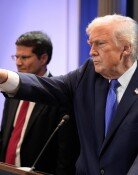Youngnam Flour Mills Dividend Doubles
Youngnam Flour Mills Dividend Doubles
Posted March. 13, 2006 08:06,
Youngnam Flour Mills will double its dividend this year, giving out 1.45 billion won to company chairman Yoo Won-gis family and other main shareholders. The company is owned by Yoo, who played golf with Prime Minister Lee Hae-chan on March 1.
Skeptics are questioning the companys intentions, however, and asking if the move is aimed at distributing profits made from selling stock in the form of increased dividends.
Youngnam Flour Mills made a profit of 6.77 billion won last November 25 when it sold its shares without notifying investors.
According to Youngnam and the Financial Supervisory Service on March 12, the company plans to hold a general shareholders meeting on March 17 and is expected to confirm its plan to give out a 150 won per share dividend, double last years 75 won per share.
Approximately half of that amount will go to Yoos family and affiliated persons, who own 46.57 percent of the companys stock. Yoo owns 34.97 percent, and his son owns 8.58 percent.
Suspicions are being raised over the companys ability to raise its dividend twofold.
Youngnam recorded 6.28 billion won in net profits last year, and it plans to give out 3.12 billion won in dividends. This means that dividends will take up almost half of the companys net profit.
Yoos family will be entitled to 1.45 billion won, which is a quarter of last years net profit.
The company gave out 33.89 percent of its net profits as dividends in 2004, and 32.65 percent last year. This year it is expected to give out 49.62 percent of its net profits, a 16 percent increase over last year.
But the companys liability was 35 billion won as of December last year, a 22 percent increase from 28.5 billion won in late 2004. Youngnams unpaid corporation tax amounted to three billion won as of late last year, triple of its one billion won debt in late 2004.
There is also criticism that drastically increasing dividends is not in line with the companys goal of attracting foreign investment for business diversification, which the company announced three times last year.
A company with steady capital inflows gives out dividends, and a company that lacks capital attracts foreign investment. A company that aims to attract foreign investment because of short capital and at the same time doubles its dividend just dont make any sense, a securities company observer said.
Wan-Bae Lee roryrery@donga.com



![취권하는 중국 로봇, ‘쇼’인 줄 알았더니 ‘데이터 스펀지’였다?[딥다이브]](https://dimg.donga.com/c/138/175/90/1/wps/NEWS/IMAGE/2026/02/20/133391101.1.png)



